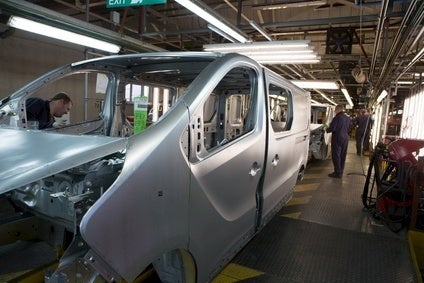
The UK light commercial vehicle (LCV) market declined in March by 27.6% year on year to 40,613 units according to the Society of Motor Manufacturers and Traders (SMMT).
“The scale of the fall is amplified by comparison with March last year, when pent-up demand contributed to the largest increase in LCV registrations since 1999,” the lobby group said in a statement.

Discover B2B Marketing That Performs
Combine business intelligence and editorial excellence to reach engaged professionals across 36 leading media platforms.
March is conventionally a bumper period due to the introduction of the new bi-annual number plate (22 this month) with more LCVs registered last month than January and February combined.
However, supply and delivery issues continued to hamper the sector, including the global shortage of semiconductors and those affecting construction, logistics and shipping, with the March market 38.6% down on pre-pandemic 2019.
Meanwhile, the cyclical process of LCV fleet renewal contributed naturally to a slower first quarter this year, following a period of robust post-pandemic recovery in 2021.
Newly registered large vans, which represent more than two thirds of the LCV market, totalled 29,230 units, down 18.9% on March last year, while medium-sized vehicles weighing greater than 2.0 tonnes to 2.5 tonnes declined by 27.6%. Small vans, meanwhile, decreased by 70.8% and pickups by 48.4%. Recent high year-on-year demand for 4x4s also slowed, decreasing 33.3%.
Battery electric vans (BEV) continue to attract interest as businesses renewing their fleets look to meet tighter air quality regulations in urban areas, with registrations rising by 17.7% to 1,909 units. Compared with Q1 last year, electric van uptake increased by 68.9% to a market share of 5.8%, more than double that of a year ago but still some distance behind fully electric passenger cars.
“Further investment is needed in the right types of chargepoint infrastructure in all regions of the UK so that more fleet and self-employed van operators can be confident to make the switch,” the SMMT said.
At the end of the first quarter of 2022, LCV registrations were down by 23.6% after three months of consecutive decline, compared with a strong start in 2021 when the construction and home delivery sectors were significant drivers of demand.
Q1 2022 saw a 27.6% fall on pre-pandemic Q1 2019.
Mike Hawes, SMMT chief executive, said: “The LCV market has made a slower start to 2022 compared with the first quarter of last year, reflecting the cyclical nature of fleet operator investment, amid global supply shortages and increasing economic pressures. Targeted support from government is needed to encourage fleet renewal and a full zero emission van market. The expansion of the Plug-in Van Grant will be a positive for the sector but equally there needs to be a greater roll-out of suitable chargepoints.”






